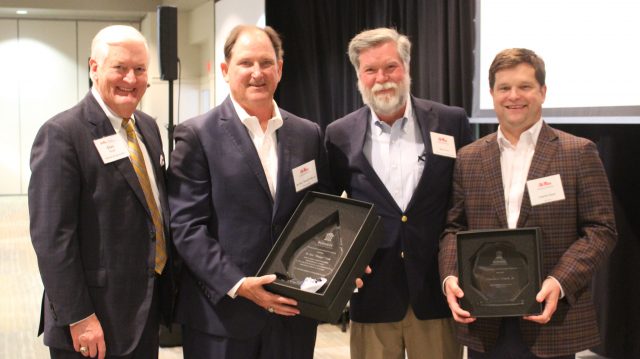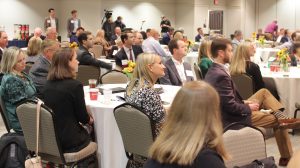
Stan Viner (left), chair of the Banking and Finance Advisory Board, and Ken Cyree (second from right), dean of the School of Business Administration, congratulate Milton Ray ‘Hoppy’ Cole Jr. (second from left), recipient of the 2023 Distinguished Finance Executive Award, and Charles Clark Jr., recipient of the 2023 Emerging Finance Executive Award. The awards were presented at the school’s annual Banking and Finance Symposium. Submitted photo
OXFORD, Miss. – Leveraging digital assets, mergers and acquisitions, trends in fintech and the use of artificial intelligence in banking were among the timely topics addressed at the 22nd annual Banking and Finance Symposium, hosted by the University of Mississippi School of Business Administration.
The conference, held Oct. 27 at the Oxford Conference Center, drew its largest audience ever, with more than 250 professionals from 17 states.
Looking to a future in the industry that will include changes in technology and the introduction of fintech and artificial intelligence, symposium organizers made important additions to the event’s content, said Stan Viner, chair of the school’s Banking and Finance Advisory Board.
“This year technology panels – Fintech, AI and Blockchain – were added to the lineup to offer more variety as banks continue to employ a ‘technology first’ strategy,” Viner said.
Christopher Mihok, managing director at Keefe, Bruyette & Woods, spoke as part of a panel examining the future of mergers and acquisitions in the industry. When asked about red flags in the financial environment and how they will affect the future of mergers and acquisitions, Mihok offered an optimistic outlook.

Participants hear from industry representatives at a panel discussion during the 22nd annual Banking and Finance Symposium. This year’s symposium set a record for the event with more than 250 registrants. Submitted photo
“To me the biggest thing is to sit tight until we have less uncertainty, more clarity (on) what the Fed is doing, more clarity as to the path of inflation, and ultimately an election that will lead to more M&As in the future,” he said.
During an afternoon session addressing digital assets and the use of artificial intelligence in financial institutions, the conversation revolved around how to regulate and manage the growth of AI.
“Companies need to set guidelines on how to use this and who can use it,” said Larry Pruss, managing director at Strategic Resource Management. “There are problems with internal inherent biases, and it could really create problems for a financial institution if your employee is using AI without some rules and guidelines.”
The closing session shifted to strategic talent planning, with a panel of experts exploring vital facets of human resources, employee recruitment and retention.
“People want to be on the winning team,” said Sean O’Neal, partner in financial services/real estate at Chartwell Partners. “People want to enjoy the people they’re with and not focus on politics. Be flexible where you can and you’ll open up the talent pool.”
With a focus on fostering positive workplace cultures, panelists discussed how to create a more positive and welcoming work environment.
“It starts from the top down,” said Marcus Mallory, executive vice president and chief banking officer at Bankfirst. “It takes time for that culture to be developed.”
Established in 1917, the Ole Miss School of Business Administration has a mission to improve business and society by inspiring students, business and community leaders through advancing business knowledge and capabilities.